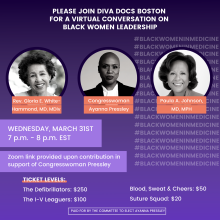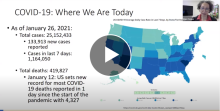News
Got an idea to support family caregivers?
Jul 07, 2021
The Massachusetts eHealth Institute at MassTech is seeking digital health startups with solutions for unpaid family caregivers to compete in the Massachusetts Digital Health COVID-19 Recovery Challenge. The Challenge is focused on finding solutions for unpaid caregivers who provide support to loved ones outside of traditional child rearing. Applications are due July 30, 2021.
Read MoreSister to Sister: Empowering Black women as health care consumers
Jun 02, 2021
When it comes to getting the care that supports what matters most, there is a lot to talk about. Community Conversations: Sister to Sister in Cambridge, MA provides a forum for Black women to learn from experts -- also Black women -- on everything from allergies to elder care.
Read MoreFacilities assess visitation policies as COVID-19 restrictions ease
May 27, 2021
From the Betsy Lehman Center for Patient Safety, a Coalition member: Health care facilities in Massachusetts are beginning to ease a series of unprecedented visitation restrictions in place since early 2020. They are now taking stock of lessons learned over the past 15 months about coronavirus transmission, infection risks and the consequences of sequestering patients and people who live in residential care settings away from family caregivers and friends.
Read MoreC-TAC Policy Forum
Apr 23, 2021
Our Executive Director, Anna Gosline, is participating in the Coalition to Transform Advanced Care (C-TAC) Policy Forum on May 12, 2021. The forum offers changemakers an insider-view of federal serious illness care policies that they can leverage to drive change in their communities.
Read MoreBlack Women in Leadership from Diva Docs
Mar 29, 2021
Join Coalition working group member Rev. Gloria E. White-Hammond, MD, MDiv for what's sure to be an extraordinary conversation hosted by Diva Docs Boston, a professional organization of Black Women Physicians in Massachusetts led by Philomena Asante MD, MPH. It's on Wednesday, March 31st at 7pm Eastern.
Read MoreMassachusetts is building a state POLST registry
Mar 29, 2021
We’re excited to announce that Massachusetts is building a state electronic registry to allow clinicians timely and trusted access to the medical forms that document patients' preferences for care near the end of life. The registry will include forms called physician orders for life-sustaining treatment, or POLST.
Read MoreNursing Schools Endorse CARES Competencies
Mar 29, 2021
The Coalition is proud to be partnering with the Massachusetts Association of Colleges of Nursing (MACN) to help ensure nursing students receive the necessary educational foundation to provide compassionate, evidence-based palliative care over the course of serious illness and through the end-of-life. Through this unique partnership, MACN has endorsed the CARES and G-CARES competencies.
Read MoreBlue Cross Contribution Jumpstarts Funding for Massachusetts Online Registry for Health Care Decision Medical Orders
Mar 23, 2021Massachusetts is building a state electronic registry to allow clinicians timely and trusted access to the medical forms that document patients' preferences for care near the end of life, thanks to contributions from Blue Cross Blue Shield of Massachusetts and the Massachusetts Coalition for Serious Illness Care.
"This electronic registry – a trusted, single source of truth - is a critical part of ensuring that everyone in Massachusetts receives care that supports their priorities," said Andrew Dreyfus, president and CEO of Blue Cross Blue Shield of Massachusetts and founding member of the Massachusetts Coalition for Serious Illness Care. "Far too often, people don't get the care they want. It was clear there was a huge opportunity to improve this part of the health care infrastructure so that clinicians all over the state can quickly access patients' documented preferences for their care when it matters most."
Read MoreNASEM's Webinar on Serious Illness Care, Structural Racism, & Health Disparities
Mar 05, 2021
The National Academies of Science, Engineering, Medicine (NASEM)'s Roundtable on Quality Care for People with Serious Illness hosted a webinar in late January on “Serious Illness Care, Structural Racism, and Health Disparities in the Era of COVID-19”.
Read MoreTalking on the phone really does help...
Mar 05, 2021
Just published in JAMA Psychiatry, Maninder K. Kahlon and colleagues conducted a randomized clinical trial to see if empathetic conversations by telephone could reduce loneliness, depression, and anxiety in at-risk older adults. The answer? A resounding yes.
Read More